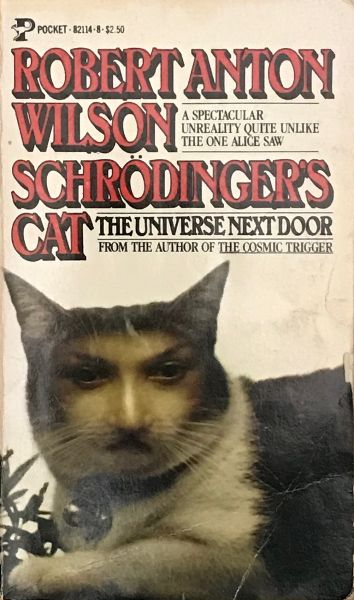Round and Round
The Universe Next Door (Schrodinger’s Cat, volume 1)
By Robert Anton Wilson

21 Jan, 2024
1979’s The Universe Next Door is the first volume in Robert Anton Wilson’s Schrodinger’s Cat Trilogy.
Despite his unusual name, Furbish Lousewart is destined to ride a wave of populist know-nothingism into the Oval Office.
At least, Furbish will do so in some universes.
In one universe, human residents of Unistat, inexplicably convinced they are the dominant species on Earth despite being vastly outnumbered by their insectile superiors, pursue diverse agendas according their whims and inclinations. Many of these agendas involve sex or drugs … or sex and drugs.
Lousewart’s Revolution of Lowered Expectations delivers to the people of Unistat a new regime of stern authoritarianism and plummeting incomes. A golden age of misery begins. Scientists vanish, to where is unclear.
However, thanks to Purity of Essence and their diligent purloining of weapons-grade plutonium, the new regime is soon moot. POE demands widespread and extreme reforms, such as the confiscation and egalitarian distribution of large fortunes. Mistakes are made. 1,700 POE nuclear bombs detonate. In retaliation, Unistat nukes Russia. In retaliation, Russia nukes China.
After a 100,000-year pause, civilization briefly recovers. Mistakes are reprised. This time it takes humanity 12,000,000 years to recover.
In a nearby universe, matters work out much the same and yet very differently. Humans still spend their days pursuing wealth and status, doing their best with minds traumatized by their upbringing. Some, like a pair of corrupt cops, do very poorly. Others fare better.
Epicine Wildeblood becomes Mary Margaret Wildeblood via mundane means. The results are all she could have wanted. An alliance of third world mystics and American revolutionaries turns to paranormal means. In short order, many of them appear to go mad, claiming to be members of the Lousewart administration. In fact, they are members of the Lousewart administration, victims of identity theft.
Therefore, in this universe it is a collection of revolutionary body thieves who must deal with the POE crisis. Will they do any better than the Unistat government did in the first universe?
~oOo~
A possibility that did not occur to me until POE annihilated American cities with their planted nukes: did The Universe Next Door inspire some elements of Kim Stanley Robinson’s California Trilogy? The nukes remind me of the first book in the California Trilogy; the two sequels in the trilogy also play with the Many Worlds hypothesis. Probably just the zeitgeist at work.
The synopsis above may give the impression the book has a coherent plot. My apologies. I blame habit and an addiction to order. To call this a novel may overstate the case. What we have are two collections of anecdotes about two closely related universes. There are many characters, too many to name, and many events — but to call all this a plot would be misleading. Addicted to plots as I am, I kept searching for one, being frustrated, and liking the book less than I otherwise might. But more of that anon.
Each of the books in the trilogy explores a different aspect of quantum mechanics as understood by Wilson. This one, as you may have guessed, looks at the Many Worlds model, in which one event plays out in every possible way it could play out.
In addition to quantum mechanics, there is unhappiness with injustice and disappointment in humans who continually fall short of what they could be. Wilson crams in a diverse assortment of the tropes that any Illuminatus fan would expect: mysticism, sex, drugs, paranoia, sex, drugs, utterly shameless self-promotion, sex, drugs. sarcastic commentary on corrupt politics, and sex. And drugs. Honestly, writers of that era had steel livers, Palladium micro-alloy glass septums, and access to weapons-of-mass-destruction-grade antibiotics.
This is a very 1970s book in just the ways one could expect from someone who co-wrote the Illuminatus Trilogy. I also note that while many of the important characters hail from overseas, I doubt that Wilson bothered to research the subject of Asian names. Other charcters are Persons of Colour from the US. Again, I suspect research played a small role in their creation. Probably an appropriate juncture to mournfully observe that “he probably meant well.”
Nevertheless, I don’t regret rereading this book despite it being a dated hot mess. There were details that surprised me, such as the TERF antagonist Mary encounters, and others, like Lousewart’s ascension to the presidency, that rang true [1] despite being embedded in lunacy and credulousness. Plus, the book was short. Remember short novels?
I do wonder if by reading just one book rather than the whole trilogy, if I am reading it wrong, if the whole makes more sense than the first installment on its own. Alas, I have no choice if I want to cover any of the books in the Tears reviews: The Universe Next Door appeared in December, 1979, the sequel The Trick Top Hat in May 1981, and the final book The Homing Pigeons in June, 1981. The cut-off for Tears being my 20th birthday on March 18, 1981, the latter two are off limits. Ah, well.
The Universe Next Door is available here (Amazon US), here (Amazon Canada), here (Amazon UK), here (Apple Books), here (Barnes & Noble), and here (Chapters-Indigo).
1: There is a scene where, Unistat intelligence agents having tortured a body-swap victim to death, the text notes:
They were all very nice men when their duty did not call upon them to perform such regrettable tasks.
Shades of Pratchett’s:
“There are hardly any excesses of the most crazed psychopath that cannot easily be duplicated by a normal kindly family man who just comes in to work every day and has a job to do.”
